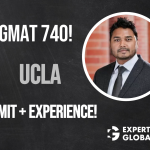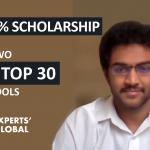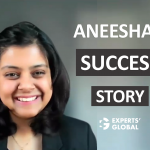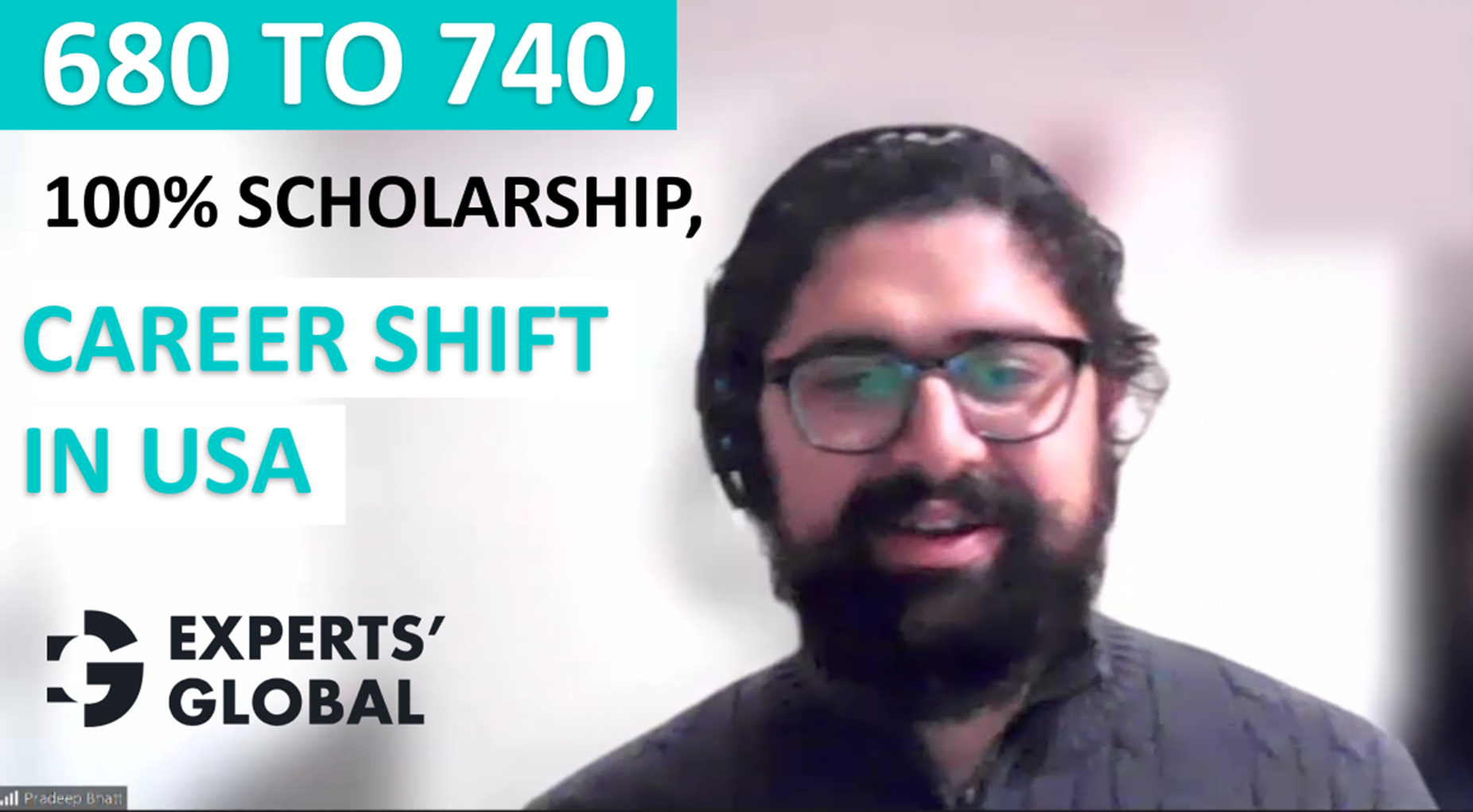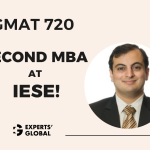Verbatim
Experts’ Global: Hi Jeetendra, thank you so much for giving us your valuable time! May we request you to please share your journey in your own words?
Jeetendra: Sure! I was born and raised in Mumbai, and I have been a city boy all my life. I completed my undergrad at the University of Mumbai, pursuing the Chartered Accountancy certification parallelly. In 2015, I joined Deloitte’s Audit department, thereafter moving to Nomura and specializing in financial and capital reporting there. Completing my CFA certification simultaneously, I wished to move into a high-impact financial role, so I looked towards an MBA education. Leveraging polished MBA admissions consulting to optimize my application process, I won through and moved to New York, four months ago, to attend NYU Stern!
Experts’ Global: What are a few factors or actions you took that made all the difference?
Jeetendra: I think, for my MBA ambitions, particularly, a lot of what I have been doing throughout my life was significant. I feel like I developed a holistic personality through the years, in the sense that I was always involved in extracurricular activities at school and at college. I remained somewhere in the top five percentile of my class, and was also very involved in the student community.
Further, my career choices have been driven by what I wanted to do more than what I should have been doing, making my decisions dynamic and narrative-worthy.
Experts’ Global: What do you think were a few mistakes you committed in the process?
Jeetendra: I think I failed to realize, as early as I should have, how many doors an MBA opens. For context, I completed my CA certification in 2015, and considering my options thereafter, read a report that said one in every four Indian graduates will have an MBA by 2025. For the longest time then, I felt that I had enough credentials to assure a storied career. Only later did I realize that an MBA is a great means to a global network. Business schools allow one to access alumni groups the world over, and reveal paths doors that would otherwise be hidden from you.
The meritocratic nature of the academic thought process in India meant that my applications represented my professional achievements and ambitions well, but did not adequately portray my personality beyond work. I even compared my MBA application with those of my classmates here at Stern, and I noticed that Indians in general tended to focus mostly on their awards and accomplishments rather than their hobbies and interests.
Experts’ Global: Going back to your GMAT preparation phase, what were the main resources that you used, and what advice will you give to future aspirants?
Jeetendra: For the GMAT, I mostly used the original material. In my experience, one needs little apart from the original material. I used it to imbibe concepts and practice my aptitude and thereafter turned to original material mocks and the Experts’ Global GMAT practice tests. At that point, I realized that my concepts were in place and that I needed to optimize my timing. By emphasizing using the original material, I made sure that I became used to the standardized nature of the GMAT.
Experts’ Global: According to you, what is the frequency of mocks that a student must take?
Jeetendra: I started off by taking a free GMAT practice test as a diagnostic to see my level without any preparation. I then proceeded to take a mock once every weekend, after starting my prep. This helped me measure my growth in concepts and application and understand where I was falling short.
I began taking a mock each morning at the same time as my actual GMAT was to be held, a week before the test itself. I took the same duration and number of breaks as actually allowed on the GMAT to condition my body and mind for the exam-day situation. I also made sure to attempt the test questions in the same order that I wanted to do on the actual GMAT.
The rigor of my approach came from seeing my friends practicing hard but not attuning their bodies to the actual GMAT conditions. I made sure that I got into a test-taking rhythm well in time, and would advise aspirants to do the same!
Experts’ Global: What would you like to say about your lessons from managing your application timeline?
Jeetendra: I am still not sure how I managed the applications because my final GMAT attempt came a little late along the timeline. I got a 690 on the GMAT the first time around, and with some help from Experts’ Global’s GMAT online course, secured a subsequent score of 750 for my applications.
Mismanaging my time impacted my applications. I had done some groundwork in terms of essay outlines and school research, and once my GMAT score came in, I sped up my application work. Even so, I missed the round one deadlines for all my targeted schools, and even ended up missing NYU Stern’s round two deadline!
Looking back, I would say that I should have applied to more than four schools. Around five to seven schools would be a better range, in my opinion.
Experts’ Global: Can you please describe your interview experience with the B-school?
Jeetendra: I interviewed for a couple of business schools, and each was different. One was a blind interview, where the interviewer had nothing but my resume, and I was supposed to drive the discussion and sell my story to them. The other was a non-blind interview wherein the interviewers were from the admissions team. They had gone through my entire application and asked me questions from all places in it.
With blind interviews, where your resume is your sole explainer for your interviewer, you have a great deal of agency. Any MBA interview preparation that you do beforehand will come in handy in these interviews, where you can push all the USPs of your profile crisply and make the interviewer buy into your narrative.
In the non-blind interviews, the kind I had at Stern, you must know every inch of your application materials. Your story has to make sense and be watertight from top to bottom, including the responses in your interview. I remember that, during my Stern interview, I was asked what my favorite movie character was because I had mentioned in my optional essay that I was a movie buff! Just know, anything and everything you write is up for inspection.
Experts’ Global: Can you tell us more about your MBA experience?
Jeetendra: My MBA experience has been fantastic. I always wanted to be in New York, which is why I chose to attend Stern. I love movies and theatre and wanted to live close to Broadway, and have been living my dream for the past four months!
I am happy that I am getting an in-person MBA experience. During the second wave of COVID-19 in India, I was afraid I might have to complete my MBA remotely, and this makes me all the more grateful now. My classmates, all 60 of them, are amazing people who know how to root for and compete with each other simultaneously. I had heard that New York is a pretty cutthroat place, but my Stern experience has dispelled that notion!
Experts’ Global: What would you like to say about your job search experience during the MBA and what tips will you give to future candidates?
Jeetendra: I would say one should pick schools based on their placement role for one’s desired post-MBA career. For example, NYU Stern does well with consulting and financial services placements, which is why I chose it. Also, consider the location you want to work and live in after your MBA. If your career interests are the biggest factor, you can ignore location, but personally, I wanted to live in New York and work in finance, which is why I picked Stern.
My job search has been smooth thus far. Every single top business school in the US is visited by the leading companies in each sector and gives you access to the same recruiter pool. What it comes down to is how you network, how you pitch yourself, what your intentions are, what your plans are, how you perform in interviews, and how you perform in the coffee chats that happen before interviews. Each school gives you the necessary resources to succeed in securing a job; it is what you do with these resources that counts.
Experts’ Global: According to you, what are a few common mistakes that all MBA aspirants must avoid?
Jeetendra: I think one mistake is focusing too much on your achievements. Do not give too much real estate to them in your essays. Your achievements are important, no doubt, but make sure to talk about your interests, your hobbies, and your personality. Often, Indians with very high GMAT scores fail to make the cut because they only focus on their awards or professional milestones and fail to tell their story as people.
Also, one should make sure to talk to MBA admission consultants. They can help you cast a wide, profile-matching net when it comes to school selection and so enhance your admissions prospects.
Experts’ Global: What would be your final message to all the future aspirants?
Jeetendra: Study well for the GMAT! As Indians, we have to aim for above-average GMAT scores. Make sure to showcase your personality holistically in your applications, and in your interviews, and back up what your applications say about you.
Be flexible about your school choice, to some extent. Like I said before, the best companies visit all the top business schools in the US to recruit MBAs, which means you will most likely have a shot at your dream role no matter the MBA you opt for.
Experts’ Global: It is quite inspiring and interesting how far you have come. Thank you so much for sharing your experience and lessons with us!
Jeetendra: It was great talking to you too. Thank you!

